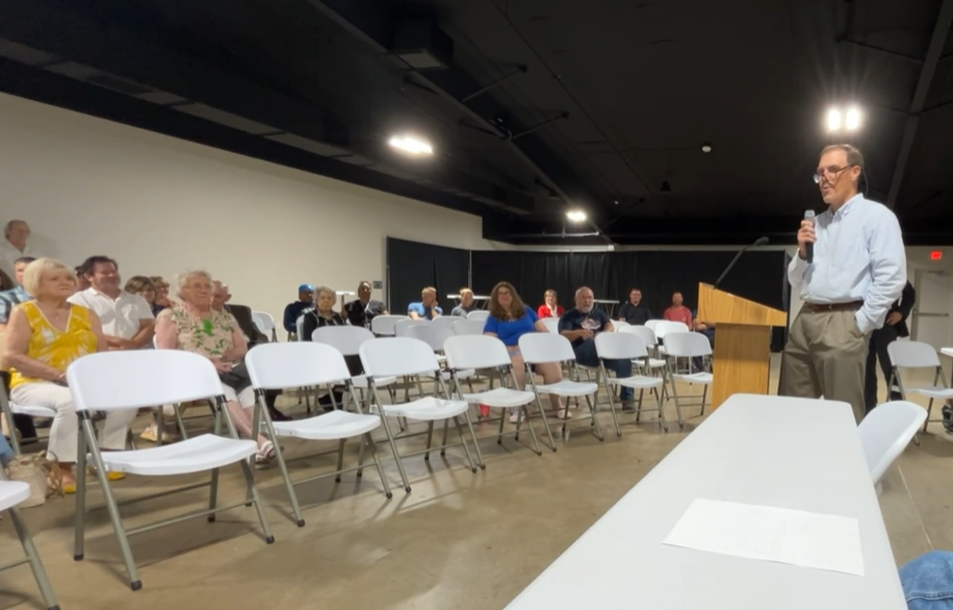Heating ranks 2nd as cause of home fires
Published 6:10 pm Friday, October 26, 2018
As Stanly seemingly moves straight from summer to winter, the sudden chill prompted the quick use of heaters sooner than expected.
Therein lies renewed risks for fire. Consequently, fire officials are urging residents to use caution as they begin heating their homes.
Insurance Commissioner and State Fire Marshal Mike Causey urges families to exercise fire safety when heating their homes.
Trending
Each year during the winter months, there is an increase in the number of home fires related to the various forms of heating. According to the National Fire Protection Association, heating is the second leading cause of home fires, deaths and injuries in the U.S.
“Half of home fire deaths occur in the night and early morning hours when people are asleep,” Causey said. “That’s why it is imperative for family members to be mindful to use the furnace with care and know the dangers space heaters present.”
Portable heaters tend to pose a greater risk, since they can easily be too close to combustible materials.
“My experience is that space heaters are often the cause of heating related fires,” said Albemarle Fire Department Chief Shawn Oke. “It is very important, if these heaters are used, that they are not plugged into extension cords, are kept a safe distance (3 feet recommended) from combustible materials and aren’t used when someone is not home.”
So far in 2018, 116 people have lost their lives in North Carolina because of fire.
Last year, firefighters in the city of Albemarle responded to 24 fires. In 2018, they’ve responded to 25 with two months still to go.
Trending
Data does not readily break down causes of those fires.
Stanly County data is often skewed since much of the reporting requires input from the various volunteer fire departments, which is often left to discretion, according to Fire Marshal Danny Barham.
In addition to fires, winter weather increases the chances of carbon monoxide poisonings. Carbon monoxide is often referred to as the silent killer because the gas released is colorless and odorless.
Vehicles, generators and home heating can produce dangerous levels in your home in a short amount of time, enough to cause illness or even death. Carbon monoxide poisoning mimics common illness such as the flu or food poisoning, with symptoms to include shortness of breath, nausea, dizziness, light headedness or headaches.
“It is very important to have working smoke and carbon monoxide alarms in the house to ensure problems can be detected early,” Oke said. “A carbon monoxide alarm is very important if the heating type involves any type of fuel such as propane or heating oil. The furnace burners can malfunction and release carbon monoxide into the area being heated without the occupants having any knowledge of it. This can easily cause death if a working alarm isn’t present.”
Heating systems should be checked regularly, since they’ve been shut down over the summer.
The North Carolina Department of Insurance, Office of State Fire Marshal and Safe Kids NC recommends the following NFPA safety tips to prevent fire, injury or poisonings:
Heating
• Keep anything that can burn at least three feet away from heating equipment.
• Have a three-foot “kid-free zone” around open fires and space heaters.
• Never use your oven to heat your home.
• Remember to turn portable heaters off when leaving the room or going to bed.
• Always use the right kind of fuel, specified by the manufacturer, for fuel burning space heaters.
• Make sure the fireplace has a sturdy screen to stop sparks from flying into the room. Ashes should be cool before putting them in a metal container, placed on a non-combustible area and stored a safe distance away from your home.
• Test smoke alarms at least once a month.
Portable Generators
• Generators should be operated in well ventilated locations outdoors away from all doors, windows and vent openings.
• Never use a generator in an attached garage, even with the door open.
• Place generators so that exhaust fumes can’t enter the home through windows, doors or other openings in the building.
• Turn off generators and let them cool down before refueling. Never refuel a generator while it is running.
• Store fuel for the generator in a container that is intended for the purpose and is correctly labeled as such. Store the container outside of living areas.
Fireplace Safety
• A portable ethanol burning fireplace, and the fuel, should only be used by adults.
• Clean up any fuel spillage and be sure all liquid has evaporated before lighting the fireplace.
• Light the fireplace using a utility lighter or long match.
• An adult should always be present when a portable fireplace is burning.
• Place the portable fireplace on a sturdy surface.
• Never try to move a lit fireplace or one that is still hot.
• Don’t pour ethanol fuel in a fireplace that is lit or still warm. It may result in a fire or injury.
• Extinguish the flame in a portable or permanent fireplace when you leave the room, home or go to sleep.
Carbon Monoxide
• Carbon monoxide alarms should be installed in a central location outside each sleeping area on every level of the home and in other locations required by law or code. For the best protection, interconnect all CO alarms throughout the home. When one sounds, they all sound.
• Follow the manufacturer’s instructions for placement and mounting height.
• Choose a carbon monoxide alarm that has the label of a recognized testing laboratory.
• Test CO alarms at least once a month; replace them according to the manufacturer’s instructions.
• If the audible trouble signal sounds, check for low batteries. If the battery is low, replace it. If it still sounds, call the fire department.
• If the carbon monoxide alarm sounds, immediately move to a fresh air location. Make sure everyone inside the home is accounted for.
• If you need to warm a vehicle, remove it from the garage immediately after starting it. Do not run a vehicle or other fueled engines or motors indoors, even if garage doors are open. Make sure the exhaust pipe of a running vehicle is not covered with snow.
• During and after a snowstorm, make sure vents for the dryer, furnace, stove and fireplace are clear of snow build-up.
• Use gas or charcoal grills outside.
Contact Ritchie Starnes at 704-754-5076 or [email protected].





